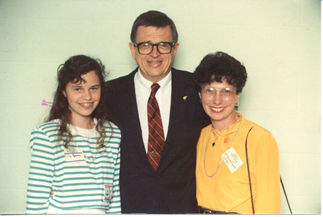Chuck Colson
Johnny Jones, October 1989
 Charles Colson had the 450 luncheon guests interested and quiet; but after my rushed trip up, including a stop at Amy's doctor's, I didn't know whether I could get much benefit from his talk.
Charles Colson had the 450 luncheon guests interested and quiet; but after my rushed trip up, including a stop at Amy's doctor's, I didn't know whether I could get much benefit from his talk.
Mr. Colson's schedule in Missouri had included time with Governor Ashcroft and several other officials; this luncheon was the public's opportunity to hear him.
The official who introduced Charles Colson called him "an evangelist, a prophet - and, now, a theologian." He was referring to some of Colson's later books, like Kingdoms in Conflict, about conservative Christian churches and the separation of church and state.
Colson sounded like a prophet when he furrowed his brow and told us, "It is vital that the Church be the Church. The Church fails when changing society is its primary goal."
He said that, despite all the big problems, our greatest crisis is one of values: how do we choose to live our lives? He quoted Margaret Thatcher, who spoke of "The moral impulse to rise above ourselves" - and how the two major transmitters of values, family and Church - are not fulfilling their mission in our society.
We heard about the great dilemma in our inner city, where 80% of children are born out of wedlock; and in our prisons, where 50% of the offenders are non-violent. And that problems in our society have to do with the fact that, in our culture, "...nothing is more significant than personal pleasure." We heard about how the inner man - the heart - needs to be changed.
My favorite story was about his visit to a remote province of India, where there was only one flight per day to and from Bombay. Hinduism there is as much culture as religion - and Christians are persecuted and thrown into prison. As he walked up to the British Colonial-style prison, with its khaki-clad guards patrolling the immense concrete structure, he thought, "Maybe I'd better mention that I'm going to give my testimony."
As he broached the subject with the Indian official walking with him, he found indifference - the equivalent of, "Sure, go ahead." As they walked farther along and Colson remembered ministers imprisoned for preaching on the street, he said, "I'm going to talk to them about Jesus Christ."
No problem. You see, within the caste system, prisoners are so far down they don't matter anymore. So what would not be tolerated outside prison walls was allowed before this massive assembly of men.
There were sharp contrasts between the prisoners on their haunches before him in the courtyard, and the flower-decorated dias for the officials. What Colson told those prisoners on the ground before him was that God loved them - He didn't care about their caste, He loved them and sent Jesus to die for them.
You could see incredulity on their faces, and Colson wanted to demonstrate that what he said was real. So he jumped down to shake hands with the men on the front row - those "Untouchables" - to show them that he, in God's name, accepted them. What happened then was rather frightening. Immediately he was surrounded by a sea of bodies; his aide could not get through, and Colson could not get out. There were thousands of hands reaching out and touching him.
After each man touched Chuck Colson, he drew back so others could have a turn. "They didn't care that I was somebody important; most of them had never heard of Richard Nixon, much less Watergate. They just wanted to know that the love of God is real." Then Colson exhorted us to show people around us that the love of God is real - to touch someone in Jesus' name.
After the speech and an appeal for Prison Fellowship, those of us who were PF volunteers were invited to a nearby church for a reception. There we had our pictures made with Mr. Colson, and I introduced Amy to my fellow volunteers. Colson presented awards for outstanding efforts for PF in Missouri, then went on his way.
And we went on ours - back to Viburnum, by way of a drugstore for Amy's prescriptions. To our own separate worlds, to try to let people know God is love and love is real. To try to erase some of the cynicism towards religion so prevalent today. To live our lives as members of the body of Christ - each in our own way.
If I can remember that God rewards faithfulness, not success; God uses our adversity to His glory; and to live my values, the talk will have been worth the drive, the hassle, and the expense. As Psalm 128:3 says, "Happy are those who obey the Lord, who live by his commands."
Afternote: Mr. Colson went to be with the Lord in 2012.
